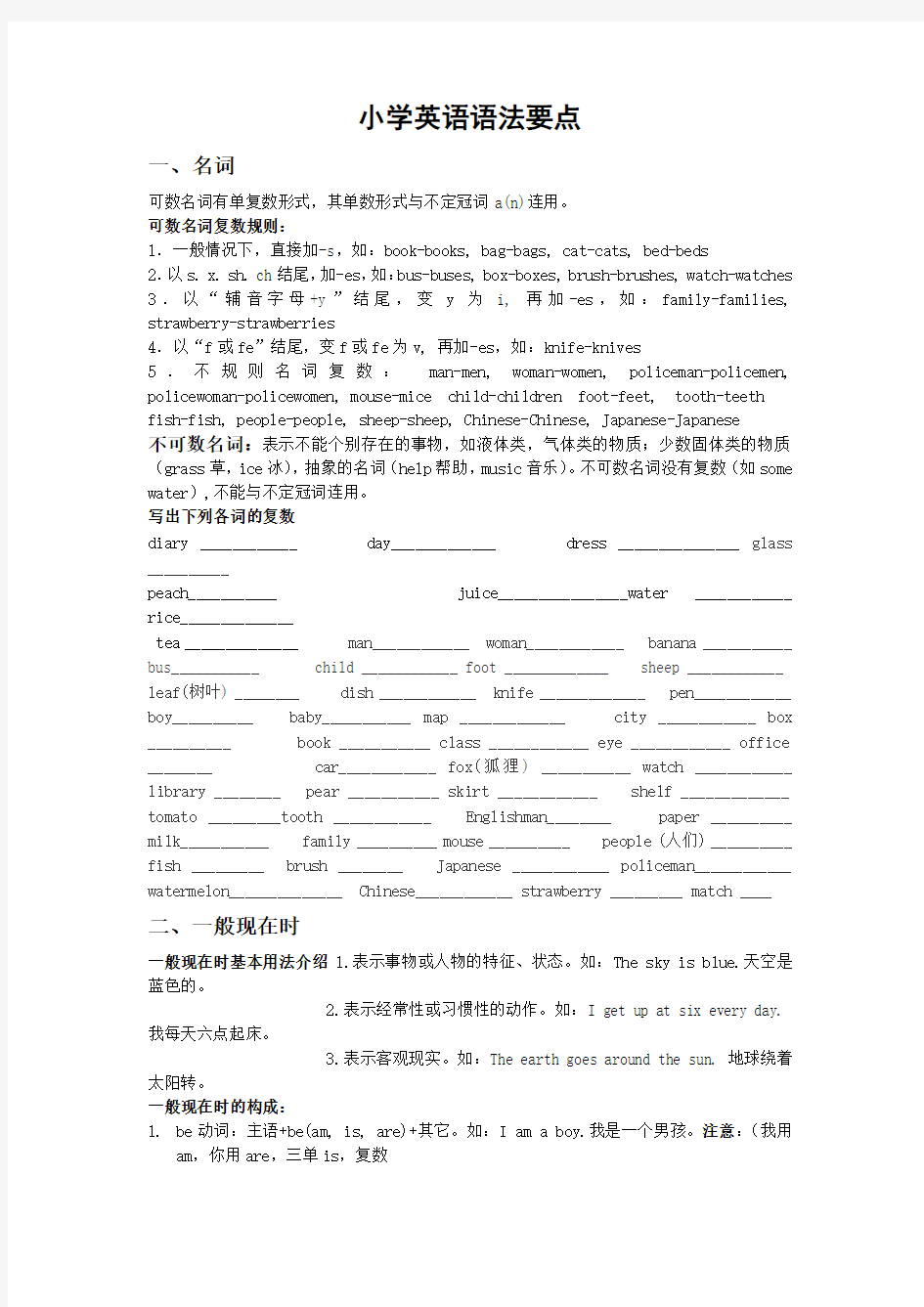小学英语语法复习要点教案

- 1、下载文档前请自行甄别文档内容的完整性,平台不提供额外的编辑、内容补充、找答案等附加服务。
- 2、"仅部分预览"的文档,不可在线预览部分如存在完整性等问题,可反馈申请退款(可完整预览的文档不适用该条件!)。
- 3、如文档侵犯您的权益,请联系客服反馈,我们会尽快为您处理(人工客服工作时间:9:00-18:30)。
小学英语语法要点
一、名词
可数名词有单复数形式,其单数形式与不定冠词a(n)连用。
可数名词复数规则:
1.一般情况下,直接加-s,如:book-books, bag-bags, cat-cats, bed-beds
2.以s. x. sh. ch结尾,加-es,如:bus-buses, box-boxes, brush-brushes, watch-watches
3.以“辅音字母+y”结尾,变y为i, 再加-es,如:family-families,
strawberry-strawberries
4.以“f或fe”结尾,变f或fe为v, 再加-es,如:knife-knives
5.不规则名词复数:man-men, woman-women, policeman-policemen,
policewoman-policewomen, mouse-mice child-children foot-feet, tooth-teeth fish-fish, people-people, sheep-sheep, Chinese-Chinese, Japanese-Japanese
不可数名词:表示不能个别存在的事物,如液体类,气体类的物质;少数固体类的物质
(grass草,ice冰),抽象的名词(help帮助,music音乐)。不可数名词没有复数(如some
water),不能与不定冠词连用。
写出下列各词的复数
diary ____________ day_____________ dress _______________glass
__________
peach___________ juice________________water ____________
rice______________
tea ______________ man____________ woman____________ banana ___________
bus___________ child ____________ foot _____________ sheep ____________
leaf(树叶) ________ dish ____________ knife _____________ pen____________
boy__________ baby___________ map _____________ city ____________ box
__________ book ___________ class ____________ eye ____________ office
________ car____________ fox(狐狸) ___________ watch ____________
library ________ pear ___________ skirt ____________ shelf _____________
tomato _________tooth ____________ Englishman________ paper __________
milk___________ family __________ mouse __________ people (人们) __________
fish _________ brush ________ Japanese ____________ policeman____________
watermelon______________ Chinese____________ strawberry _________ match ____
二、一般现在时
一般现在时基本用法介绍1.表示事物或人物的特征、状态。如:The sky is blue.天空是
蓝色的。
2.表示经常性或习惯性的动作。如:I get up at six every day.
我每天六点起床。
3.表示客观现实。如:The earth goes around the sun.地球绕着
太阳转。
一般现在时的构成:
1.be动词:主语+be(am, is, are)+其它。如:I am a boy.我是一个男孩。注意:(我用
am,你用are,三单is,复数
2.行为动词:主语+行为动词(+其它)。如:We study English.我们学习英语。
注意:(当主语为第三人称单数(he, she,it)时,要在动词后加"-s"或"-es"。如:Mary likes Chinese.玛丽喜欢汉语。)
1,一般疑问句:一般以is ,are,am,can,do,did,does……开头的。回答用YES/NO.
特殊疑问句:what,who,why,whose,which,where,when,how,how many,how,much开头的,需要具体回答。
行为动词的变化。肯定句:主语+动词原形(+其它)。
否定句:主语+ don't( doesn't ) +动词原形(+其它)。
一般疑问句:Do( Does Did) +主语+动词原形+其它。(句首加助动词do, does did)
动词+s的变化规则
1.一般情况下,直接加-s,如:cook-cooks, milk-milks
2.以s. x. sh. ch. o结尾,加-es,如:guess-guesses, wash-washes, watch-watches, go-goes
3.以“辅音字母+y”结尾,变y为i, 再加-es,如:study-studies
一般现在时用法专练:
用括号内动词的适当形式填空。
1. He often ________(have) dinner at home.
2. David and Tom _______(be) in Class One.
3. We _______(not watch) TV on Monday.
4. Mike _______(not go) to the zoo on Sunday.
5. ______ they ________(like) the World Cup
6. What _______they often _______(do) on Saturdays
7. _______ your parents _______(read) newspapers every day
8. The girl _______(teach) us English on Sundays.
9. She and I ________(take) a walk together every evening.
10. There ________(be) some water in the bottle.
11. Mike _______(like) cooking.
12. They _______(have) the same hobby.
13. My aunt _______(look) after her baby carefully.
14. You always _______(do) your homework well.
15. I _______(be) ill. I'm staying in bed.
16. She _______(go) to school from Monday to Friday.
17. Liu Tao _______(do) not like PE.
18. The child often _______(watch) TV in the evening.
19. Su Hai and Su Yang _______(have) eight lessons this term.
20. -What day _______(be) it today- It’s Saturday.
改错(划出错误的地方,将正确的写在横线上)
1. Is your brother speak English __________________
2. Does he likes going fishing __________________
3. He likes play games after class. __________________
4. Mr. Wu teachs us English. __________________
5. She don't do her homework on Sundays. _________________三、现在进行时
